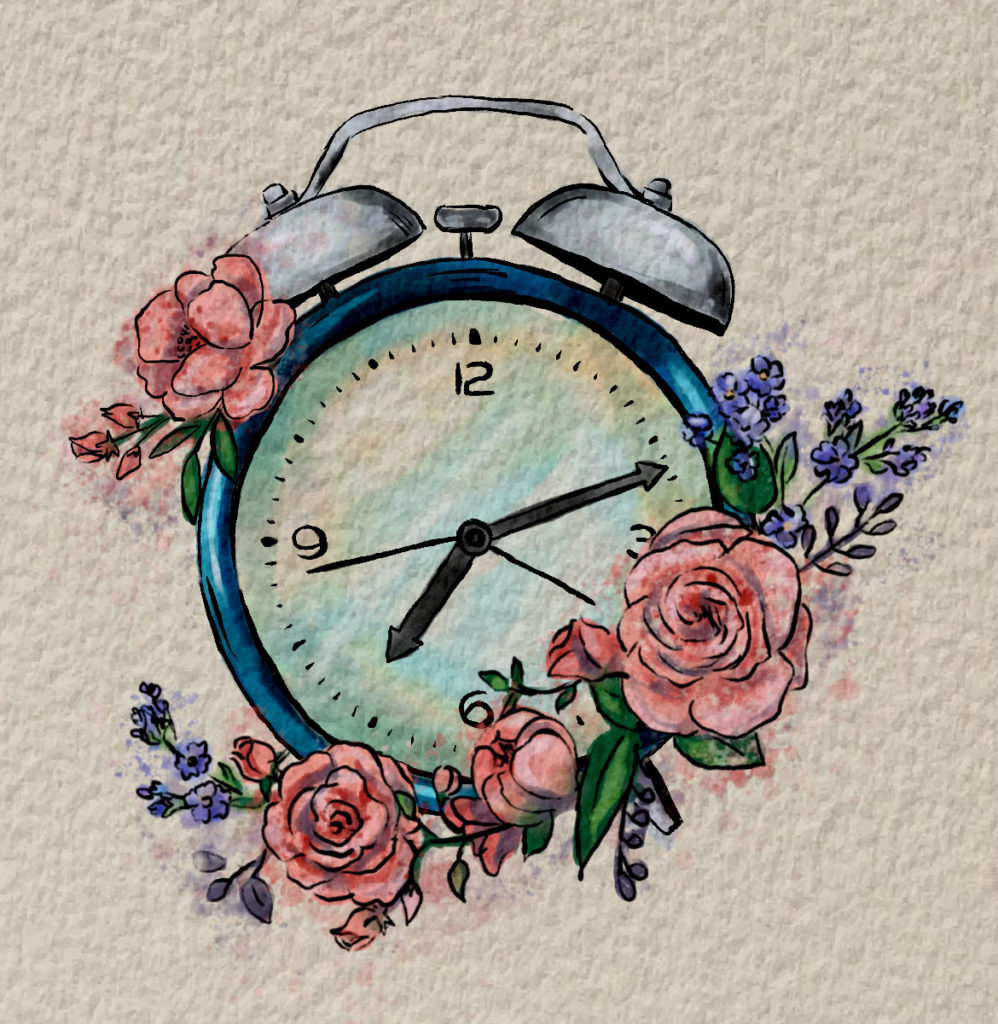
Last Moments
Alia Anor
Alia Anor uses soft science fiction to reflect on how precious time is…
Artwork by Katie Barrett
“Mama, Nana won’t wake up.”
I look up from the book in my hands to my child’s chubby face. Tilly is not concerned and neither am I. Instead, I sigh and go to my mother’s bedside.
The nursing home is plain. White floors stretch into white walls and white sheets. Rubber squeaks against linoleum. The scent of freesia and bleach hangs in the air. A sterile environment free from emotion, from vibrancy, as if that can stall the approach of death.
My mother is pale with age, hair long since leached of color, blending into the bedding. A vivid picture book of neon insects and cartoon animals slumps against her like a rose in a casket.
I cup my hand against her warm cheek and watch the rise and fall of her chest. “She’s just sleeping,” I tell Tilly. Tilly nods. Nana does this often.
*
I haven’t explained why to Tilly. Not yet. I’ve tried talking to my mother, tried to convince her not to push so hard.
“I want to spend every minute with her,” my mother explains to me during another one of our arguments. “Selene, honey—you’ll understand when she’s older.”
“I understand now,” I say, the edge of my voice breaking into a raw, angry growl, “but if you keep undoing, Tilly won’t remember you.”
I’ve done this myself. Not often. As a parent, I am sufficiently sleep deprived every day. The last thing I need is to add temporal sleep deprivation from an idle undo. But, on that rare occasion when all the stars are aligned and Tilly is content curling up against me and I just want to watch her forever and ever—then I undo that time, just once, to enjoy the moment a second time.
I sound cruel to begrudge my mother for acquiring extra moments with her granddaughter before she succumbs to death. When she sends her consciousness back in time, she can make different decisions and fill her memory—only her memory—with timelines that could have been. But the memories have a cost—exhaustion akin to sleep deprivation, amplified by every minute undone. She can experience our visits to the nursing home over and over by undoing, but when she pushes it too far, the exhaustion forces her into ill-timed, unhealthy sleep.
“You remember Tilly,” I beg her to understand, “at the cost of taking the memory from her.”
Once Mom falls asleep, Tilly doesn’t get to spend that time with her nana. All the precious hours she must have spent reading from that bright book in this bright time of her life, none of them to be treasured by Tilly in the end.
“I’ll do better next time,” Mom promises. “Bring her again. I won’t overdo it.” But she does.
The doctors have already extended her time beyond our expectations. We thought she would die when Tilly was two, too young to retain the memories anyways, but Tilly is three now. My husband claims Tilly is still too young to remember much. He’s unconcerned about these events. I worry alone.
*
This visit, like so many others, I slide into the bed next to my mother and lift Tilly onto my lap. We take the book from my mother’s limp hands and open it. Tilly reads with me—while she can’t read the words on the page, she has this book memorized.
Eventually, my mom stirs once again. I see her face crinkle into a smile. Her hand reaches over to interlace with mine and I lose the page. Tilly secures the picture book and faux reads to us, embellishing on her favorite pages. Mom is too tired to move much, but the joy stays even after her mouth is too weak for a smile.
Through practice, I can hold in the tears.
I excuse myself, making Tilly promise to keep reading to Nana. I step out the door and take a deep breath in the hallway. In, out, I breathe deep and slow until my breath is smooth.
Inside the room at my back, I hear my daughter’s voice oscillating between high and very high pitch impersonations of the various creatures. She pauses periodically for a soft murmur from my mother, so soft I can only imagine the response.
I clear my face before the end of the time we have with her today. When I come back in, Mom knows the hour has ended. I set Tilly to putting her coat and shoes on and stop by Mom’s bed once more.
“How long did I miss?” she asks me.
“Ten minutes.”
She lets out a breath of relief.
“How many times?” I ask.
“Honey—”
“How many times?”
“Four.”
My breath loses its serenity. Four undos. She experienced this hour for four hours and fifty minutes, four hours of an alternate timeline and fifty minutes awake in the final reality. A success for her. Meanwhile, Tilly only got fifty minutes instead of her full hour.
Last week, Mom got five undos out of our visit.
“Next time,” I start to negotiate, but I stop. Unnecessary. Mom knows the rest of this speech as well as I do, but she’ll do whatever she wants no matter what I say.
I look down at her. This close, I can see the purples of varicose veins, and the sag in her skin, so thin, hanging limp off her arm, little muscle to cover. Surrounded by these folds, her eyes seem larger to me.
“I love you, honey.”
I swallow. I’m still angry. “I know.”
Tilly is ready to go. I lift her into the air, her little rain boots tapping my stomach before I pull her inwards for a hug. “Say bye-bye to Nana.”
*
For our next visit, Tilly brings two different picture books and her latest artistic masterpiece for Nana’s collection. I bring a new plan.
“Mom,” I break into our socialization time. “I’m going to let you two play. It’s fifteen after. Fifteen. Are we clear?” Four undos of just the forty-five minutes should leave her functional for each, even with the decline.
I can tell she understands when she doesn’t respond and I turn away, hoping I just saw her fourth flip back of time and not more, although I’ll never really be sure. We never know what happens on other people’s complete timeline, only our own. Mom stayed conscious, a good sign.
Behind me, I hear her talking to Tilly. “You’re such a cute girl.”
Tilly babbles excitedly at her nana, so well-behaved for these visits.
“What’s your name, honey?”
Ice pours over me. I reverse. There’s my mom. She’s smiling at Tilly, but her eyes aren’t all there. She looks at me with a horrifyingly surprised expression.
“Selene, what are you doing here?”
I snatch Tilly away and we run into the hallway, Mom’s protests ringing behind me.
“Nurse? Doctor?” I shout wildly. This is too much. These places are so understaffed that it takes two whole minutes before I locate someone. Two minutes of Tilly’s crying and my wandering.
They are in little rush once they hear her symptoms. One nurse checks on her, the other sits me down.
“I know this can be hard to hear,” the nurse says, “but sometimes patients with dementia like this can forget recent additions to the family.”
“Not like this.” I shake my head vigorously. “She was fine one moment and then the next…”
The nurse nods politely as I trail off. I think she’s not hearing me until she says, “Right after an undo, there can be—”
I cover Tilly’s ears with my hands for my moment of anger. I know she can hear me—the hands are to make me feel like a better parent. “We agreed to limit… no, of course, she never listens.”
“The good news is that her memory will come back after some rest.”
She doesn’t tell me the bad news because I already know it. This is a bad sign. I try to remember to be happy. After all, she made it through that bout of pneumonia last winter, past all expectations. Dementia is an inconsistent disease. She could be lucid for years after this, assuming her cancer stays in remission. Unlikely, but possible.
*
I come back alone the next day. Not knowing I’m coming, she has dropped all pretenses of getting better. She’s wheeled out in front of the television with the other patients and she visibly struggles with any action. All this deterioration that she hid from us. The reason the doctor said she needs to rest.
“Hi Mom,” I say quietly. I wheel her back to her room so we can talk undisturbed.
“Just you today?”
“Just me.”
She won’t look me in the eye and I don’t know how to start this conversation. We sit in silence together, my hands plump but starting to creak, hers withered to the bone with oversized joints.
She starts with a sudden angry gusto, offensively straightening her back, “I just—”
“Mom!” I shout, as if her words were the starting horn for a race. “You can’t just do whatever you want anymore. It’s not fair to Tilly, it’s not fair to—” Just like that, the words choke off again.
“I know,” she says. “I know. They explained what happened.”
“Please?” I ask. Light warps through the unshed tears in my eyes. I blink too many times to be subtle.
She grasps my hands, our tremors softly swaying together.
*
Tilly brought two drawings today, one crayon and the other marker. The people are discernible. Her nana is very proud.
I don’t read here anymore. I just watch. I help when needed, when Tilly wants something too difficult from her nana.
Mom is so happy and alert that sometimes I forget what the doctors say. Without undos, I’m seeing her at her finest, her first time through, and comparing it to the weeks when she could still repeat this time over again.
I waited so long to have Tilly. I wish Mom could see her grow up. Tilly’s memories will be vague and I need to carry some for her. I take pictures of the two of them at optimal moments, taking care to avoid disturbing the fun.
“Selene,” Mom calls to me at the end of our hour. “Honey, you look tired.”
I smooth the wrinkles above her eyes but leave the smile around her mouth untouched. I kiss her forehead for a second time today, the first existing only in my memory.
Alia Anor lives in Washington (the state) with her husband and the love of her life (her dog, Dutchess). Her writing is fueled by chocolate and dark stormy nights (or at least the constant NW drizzle). You can learn more at aliaanor.com.
Get an update when we post a new short story when you follow us on Facebook, Instagram, and Twitter, or sign up to our newsletter here.
